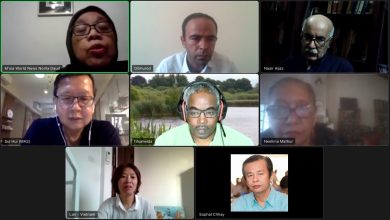
By Dr. Hassan Humeida
KIEL, GERMANY: The term “forgotten war” refers to conflicts that, despite their often significant consequences, receive less attention in public perception and historiography. These wars receive less media attention than other well-known conflicts and often remain unnoticed in the collective memory. One example of such a “forgotten war” is the Korean War (1950–1953) in Asia, which in some countries receives little attention compared to other similar wars.
Time moves on, and the same term is being used to describe the most important events in the heart of Africa: the “forgotten war in Sudan.” This term refers to the internal conflicts that have shaken the country for years and have so far received little international attention. Conflicts such as the fighting in Darfur and the Nuba Mountains, as well as clashes between various armed groups, have had devastating consequences not only for the Sudanese population but also for neighboring countries.
The war began more than two years ago and has so far displaced, raped, injured, and killed thousands of civilians. What is unique about this “forgotten war,” however, is that it’s also a proxy war. Wealthy countries are trying to expand their influence in a geographical region to which they have no direct connection. Fraudulent states, sometimes posing as mediators, finance the warring parties so they can continue fighting until their last breath, even when they are far away.
This happens at the expense of the civilian population, composed of diverse social classes, who are deprived of their strength and suffer the consequences of the war. Some of these countries manipulate human rights and profit from the suffering of the displaced and homeless in refugee camps, while simultaneously smuggling weapons and military equipment across their borders, thus further fueling the conflict.
So far, the world has largely ignored the “forgotten war in Sudan,” even though more than 18 countries are supporting the conflict in various ways. The suffering of the civilian population in the camps for displaced persons and refugees at home and on the borders of neighboring countries continues. Some provide aid, others refuse helping afflicted people.
The suffering of the Sudanese population is complex and has grave consequences: According to international reports, the mass displacement and flight have caused the largest internal displacement in human history.
The war in Sudan is a humanitarian crisis that, despite its immense suffering, often fades into the background. Due to displacement, many families are forced to leave their homes and seek refuge in neighboring countries. The main reasons for this are the search for safety, medical care, or education. Some people are still persecuted by armed groups, while others suffer from chronic diseases that require specialized medical treatment. In the educational sector, generations have lost between two and more than three years of schooling due to the war.
This forgotten conflict has had devastating consequences: infrastructure was destroyed, communities were torn apart, and massive displacement and a humanitarian catastrophe occurred. Many people have lost their families, their homes, and their prospects.
The consequences for the future are grave: persistent poverty, lack of education, war and after war trauma, and insecurity shape the lives of many.
The war also fuels transnational organized crime and human trafficking. They also threaten sustainable development locally and contribute to the global balance sheet, as conflicts waste valuable resources and destroy the potential of future generations. Growing up in an unstable environment is uninspiring and burdens the future rather than enriching it.
It is crucial not to forget the “forgotten” war in Sudan and other conflicts. Only then can we learn from the past and find sustainable solutions. International support for peace processes, reconstruction, and social rehabilitation is crucial to help local populations and ensure a better future for future generations.
The opposing sides should know one thing: after war, there are no winners – even when it takes longer. What only remains after a war is loss, destruction, and terrible memories – forever.
E-Mail: hassan_humeida@yahoo.de




